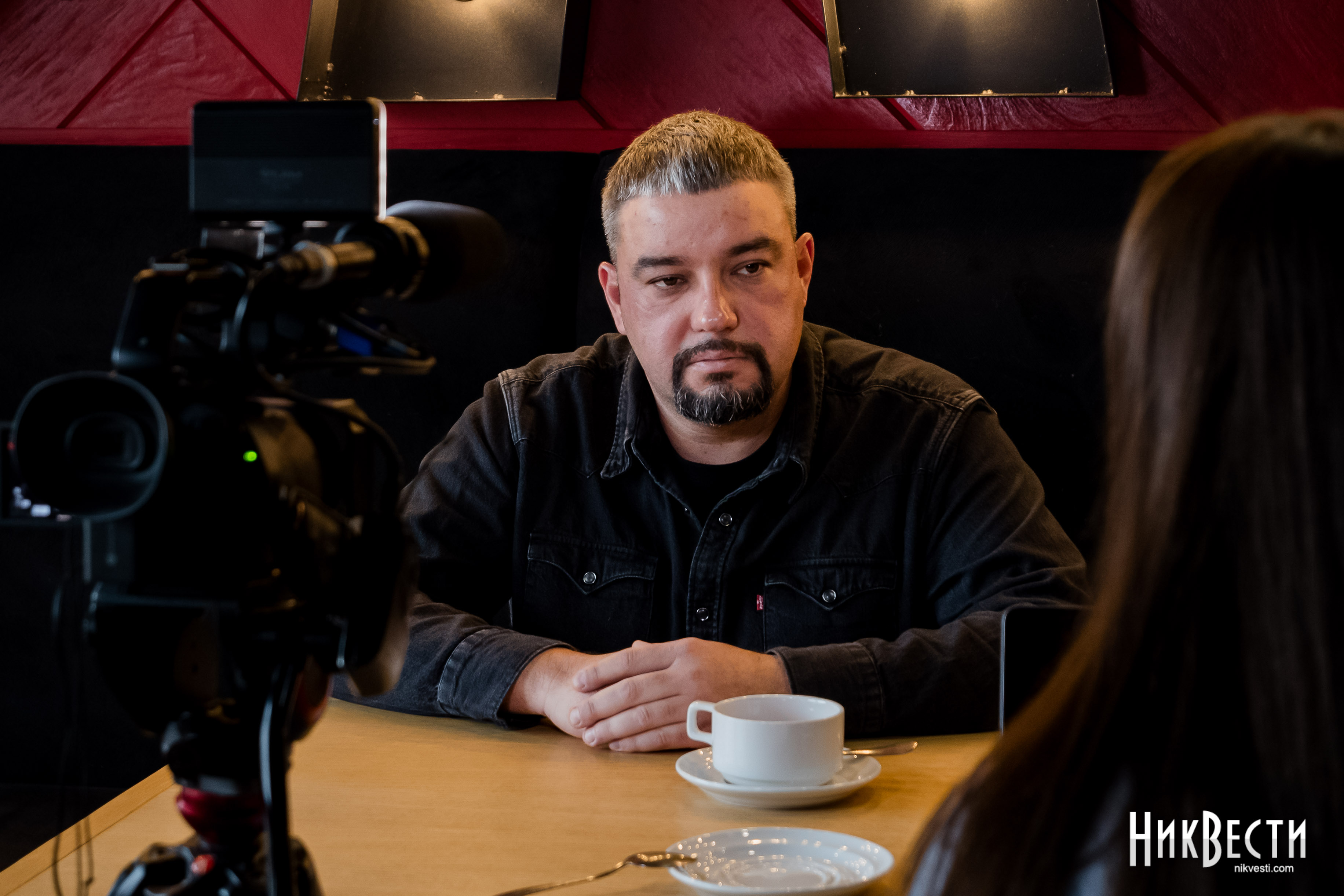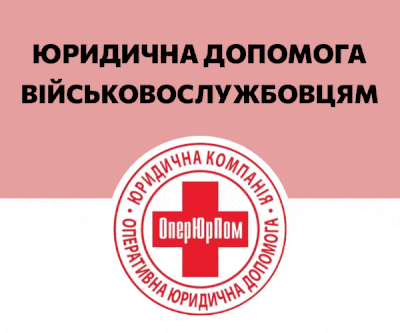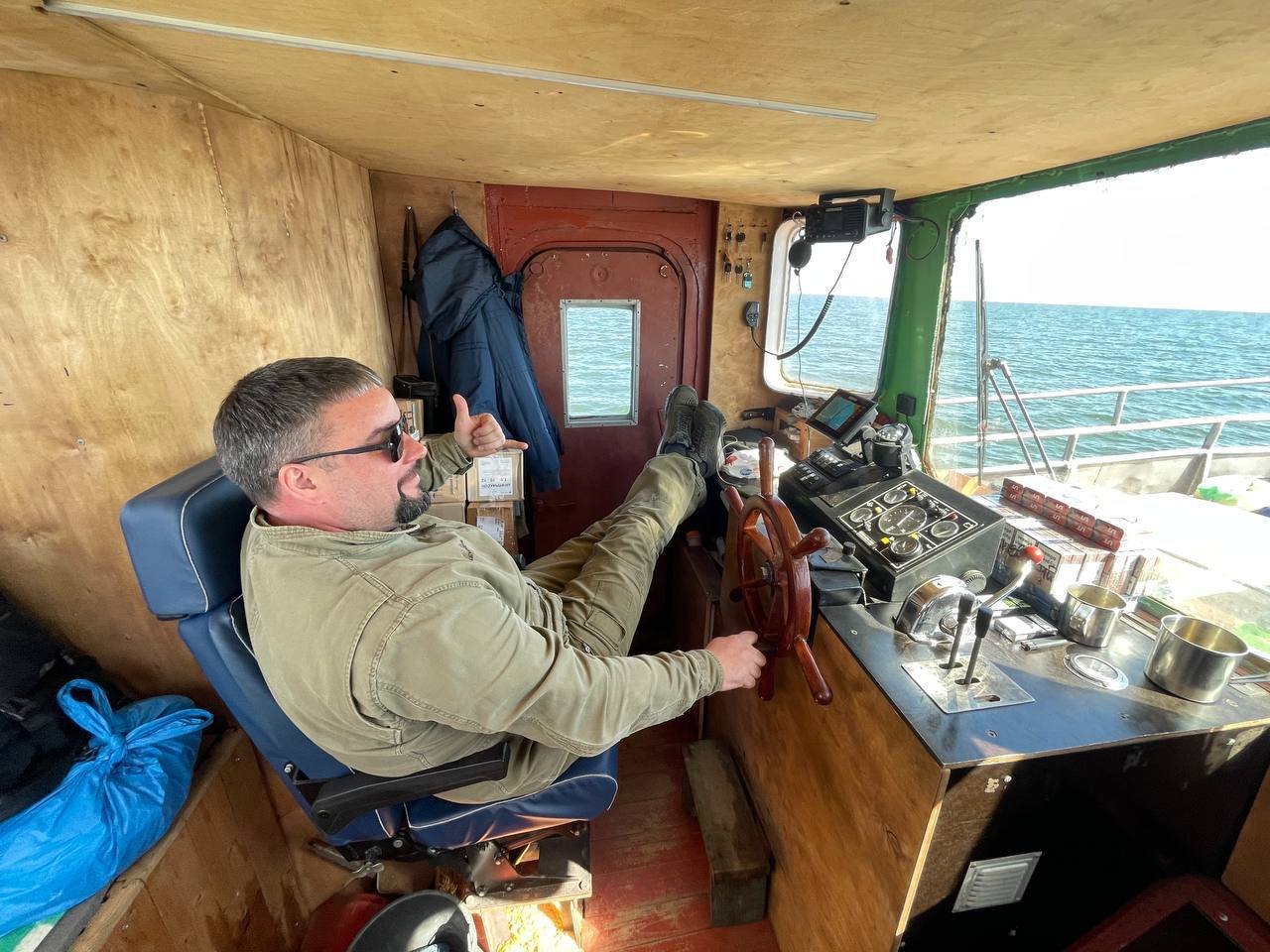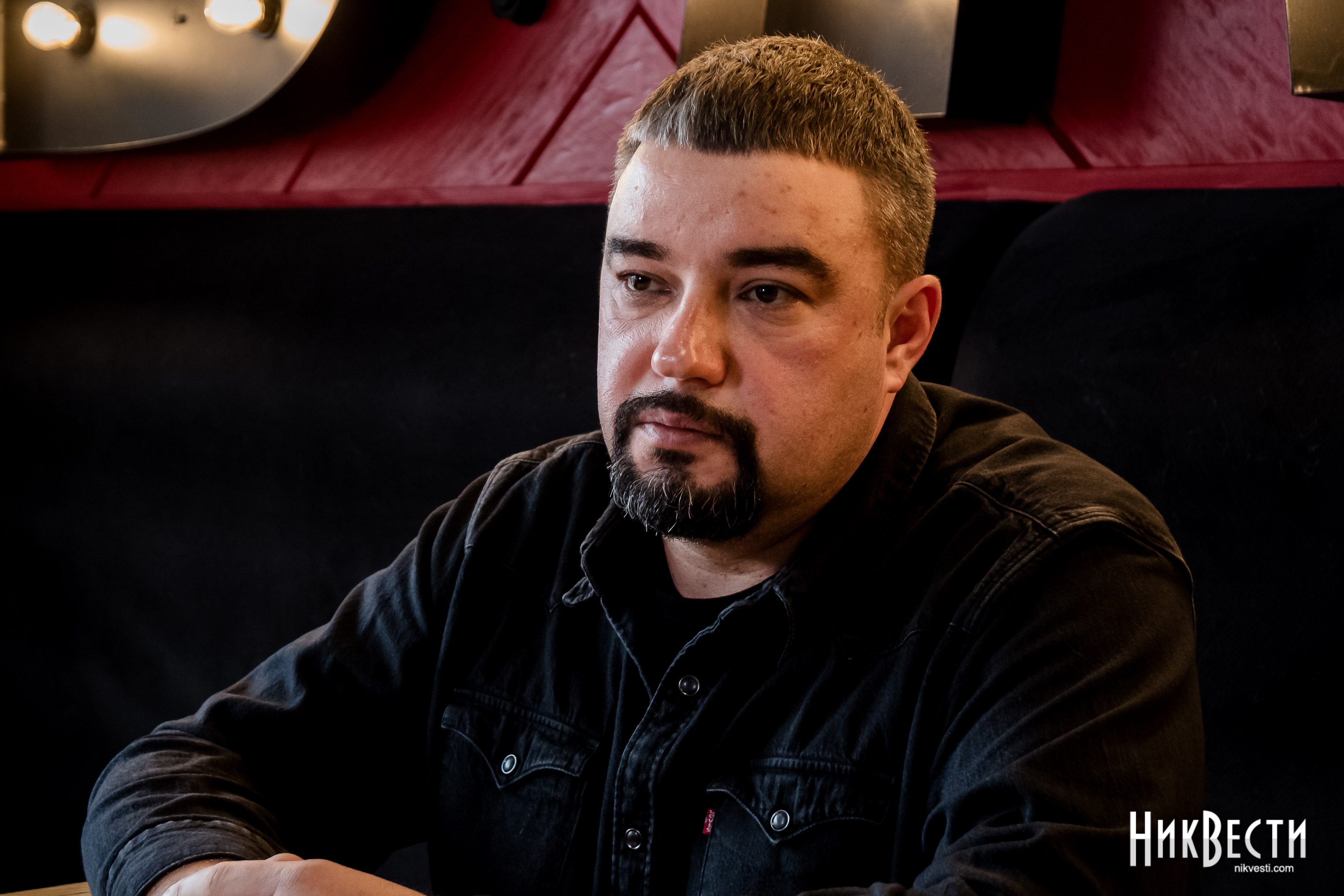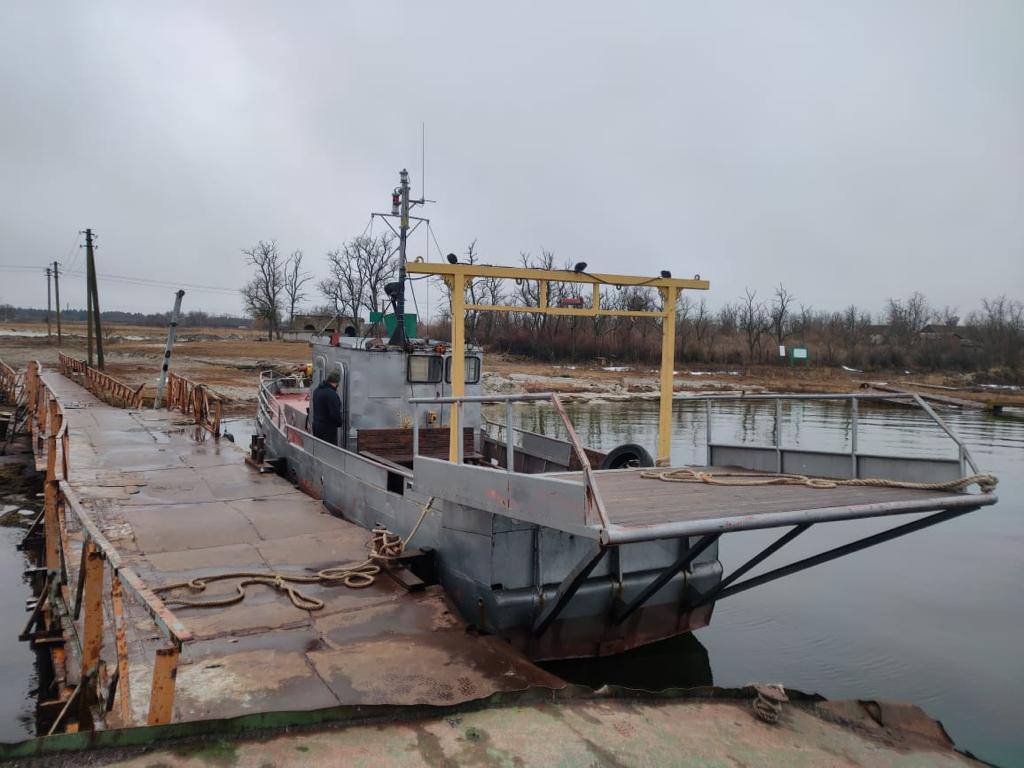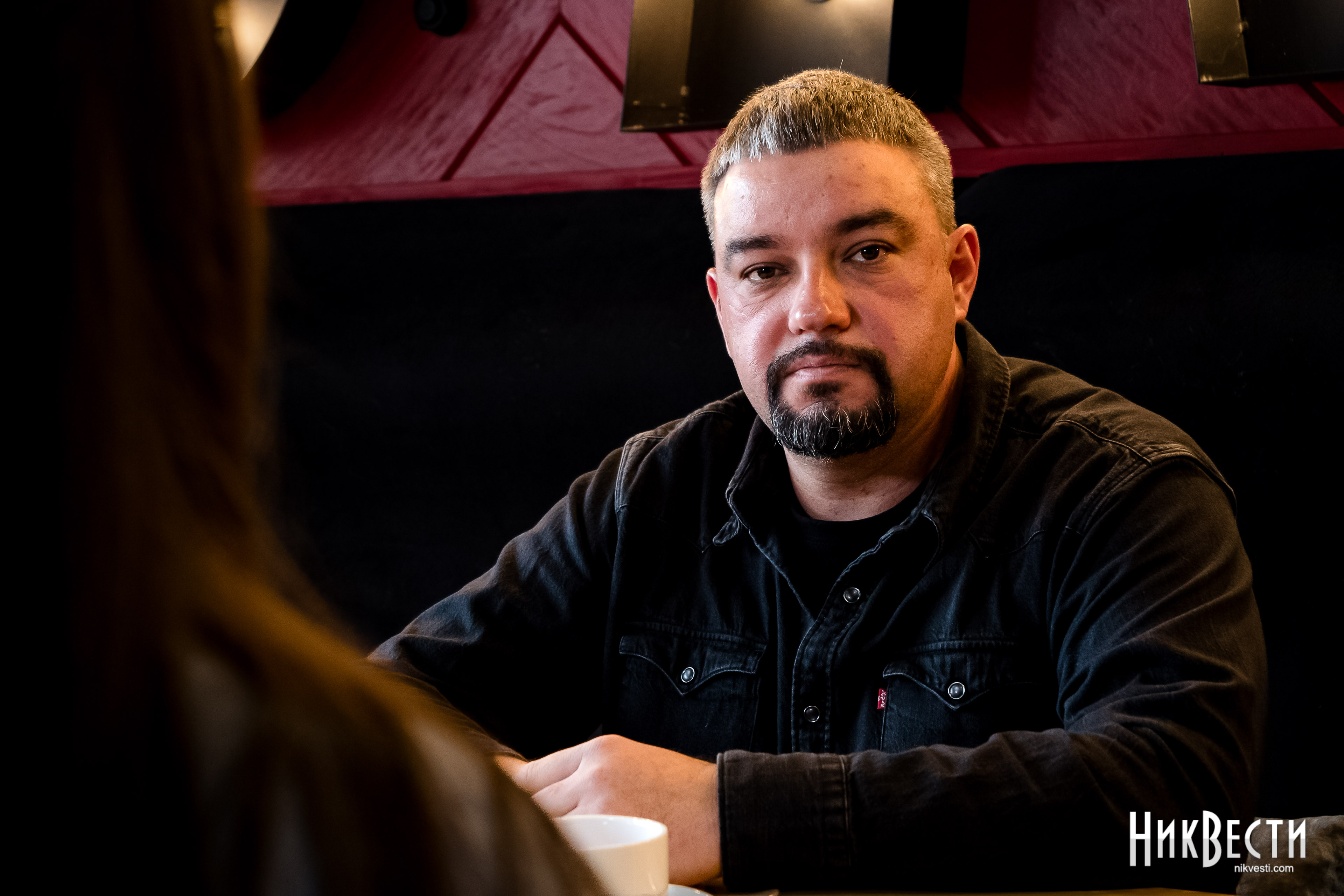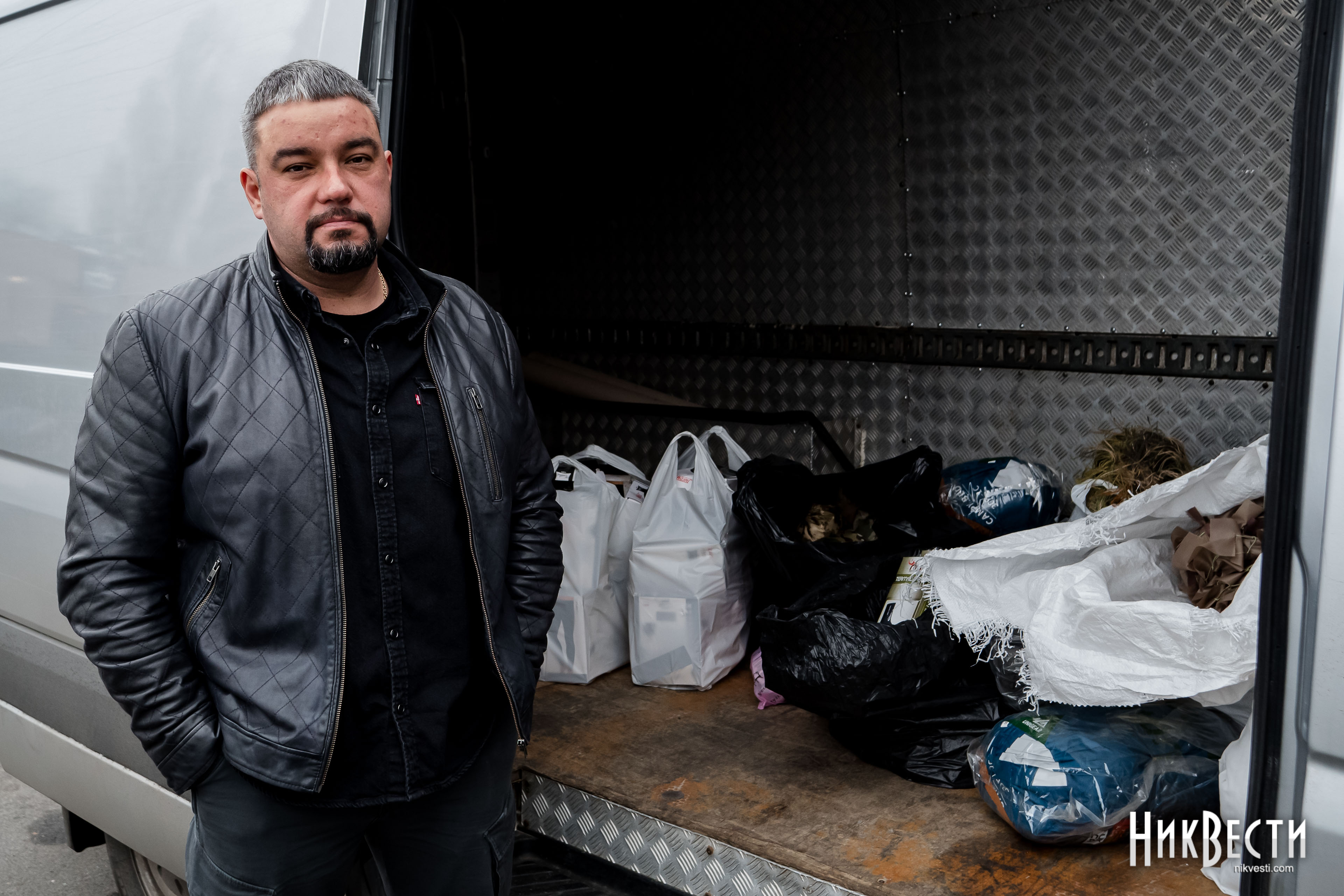The story of Yevhen Poltavchuk, who took people out of the occupied Kinburn spit under fire
- News of Mykolaiv
-
•
-

- Yuliia Boichenko
-
•
-
10:09, 26 January, 2024
Until 2022, a resident of the Kinburn spit Yevhen Poltavchuk was engaged in commercial fishing and planned the development of mussel and oyster farming on the spit. There he had his own shop and a cafe on the beach. However, the Russian invasion in February 2022 radically changed the lives of the inhabitants of the protected area and forced them to leave their homes.
Evgeny Poltavchuk evacuated the inhabitants of the spit to the mainland of the Mykolaiv region on his own industrial vessel for several months.
In an interview with NikVesti, Yevhen Poltavchuk told how he managed to take more than a thousand people out of the occupation despite the closed sea under fire, what difficulties he had to face and what he is doing now.
On the destruction brought by Russia: «They destroyed the last 12 years of my life»
— When did you decide to take the keys to the ship and start the evacuation?
— In winter, we operated a connection between the Kinburn spit and Ochakiv. It was not a commercial matter. The road through the Kherson region is very long — almost 200 kilometers to Mykolaiv. That is why I agreed with the Ochakiv authorities that I will transport people with my industrial vessel. That is, we went like a shuttle taxi. When a full-scale war began, we decided not to stop, because people also need to deliver humanitarian aid. There were a lot of people who wanted to go to the mainland, because no one knew how it would turn out. It was a large and comfortable ship, but an industrial one.
In total, I have four vessels and three motorboats that were destroyed on the Kinbourn spit. And here is one big steamship, which was really able to transport about 110 people at the same time.
— That is, this is your only ship that survived. Where is it now?
— It is in Ochakiv. But I don't know what his fate is now. It stands on the pier, where it was. We managed to get him out of the water, but now this section is being shot from the side of the Kinburn Spit. It is dangerous to go there during the day or at night and see what happened to him. We hope all is well.
— Have you calculated the losses you received due to property destroyed by Russia?
— They destroyed the last 12 years of my life. The first house they destroyed on Kinburn Spit was mine.
The Russians had lists of those who help with the transportation of people. Someone had given them these lists, and they were fairly accurate with addresses. On July 14, my house was completely destroyed along with animals, equipment, and furniture. It was a small house with a fishing station where you could cook Black Sea shrimp. Journalists came to me and filmed how this whole process was happening. We tried to make it look as good as possible and for the last 10 years I have put all my resources into developing it on Kinburn Spit. We wanted to show people that there is such a location, that this is our special feature, our product and it is very tasty.
— Do you plan to restore what was taken by Russia after the de-occupation?
— You know, Kinburn spit — it's in the heart. Either the mosquitoes will eat you so that you will not return there, or if you stayed there, it will be for years, for ages. This is my favorite location, a place of strength. It got to the point that I lived there in the winter as well.
We created the public association «Kinburn Life». Now we will ask for the help of international partners who will help us in demining and planting forests. We need to restore Kinburn, because it is not only our Ukrainian location, but also a worldwide nature reserve. There was not much forest, there were not many animals. That is, we have a lot of work ahead of us and I believe that at least our children will find the Kinburn that we saw him as.
First, medicines and food were transferred to the peninsula
— Did you evacuate people yourself or did you have a team?
— We rallied on the Kinburn spit with the locals. That is, my business was to come to the spit. We created a hub in Mykolaiv, from where people could transfer something to their loved ones or relatives on Kinburn spit.
Medicines and food were delivered there for free. And then people stocked up on five bags of flour each. It was difficult, but we coped with all the questions. Our Mykolaiv warehouses issued to Hola Prystan, to the Kherson territory those medicines that were not available at that time: insulin, for example. We even delivered a lot of medicines to Hola Prystan for social pharmacies and hospitals, because the road was already closed. People began to learn about our route, about the possibility of helping. At extreme times there were a lot of them — already at the limit of the possible.
— You say «we». Who helped you in this?
— My assistant is Kyrylo Lukianov, my son-in-law Oleksandr Bondarenko. Dara Shpolianska, a journalist from Mykolaiv, who is also a member of the Kinburn Life team, was engaged in grouping like-minded people.
There were a lot of people there in the places. You understand what the human factor is. We brought humanitarian aid, started distributing it: some got it, some didn't. That's why we constantly changed the people in charge, so that there was trust. Everything came from our regional humanitarian headquarters — they provided a lot of help. The only question was how many people and what needs — everything was enough.
— Were you the initiator of the evacuation of people? Did you form a team for this?
— I was the captain on this ship. It is very responsible, but there was no need to look for anyone. People rallied themselves, offered help, warehouses, car transportation, and so on. There are people who, with the beginning of the war, did not save their own skins, but rallied around Kinburn, and people whom we can help. We were not looking for anyone, everyone somehow united.
Organized evacuation «at your own risk»
— How exactly did your first evacuation trip take place? Did people call you first or did you understand that they would need help there?
— My first departure was coordinated with the leadership of the Ochakiv community. It was really at our own risk because we didn't really know the situation around Kinburn Spit. You understand what kind of territory there is. At night, you can go there and wait for us (the Russians were able to track the movement of the evacuation vessel, note). The first time we were refused, because no one knew what it would be like there.
— Did you get permission from the local authorities or the command itself?
— Yes, command. And then, the very next day, they called themselves, said that there are people there, there are needs and that they should go. We took people on the first trip. The first times we did not deliver humanitarian aid yet, because we were just setting up the process. But we left there and on the way we received calls from acquaintances — employees of the state hydrography, lighthouse workers from Maiskyi Island — and asked them to evacuate as well. We returned to Ochakiv, dropped people off, because it was a risk, because Maisky Island is a military unit and any movement there is very dangerous. But we, thank God, took people from there.
— Besides you, were there other people and ships involved in the evacuation from Kinburn?
— At that time we were the only ones. I don't know anyone else. Maybe only the military, some operations, we don't know.
— How did people contact you?
— Differently. It was like word of mouth. My mobile didn't go silent for a minute. Everyone was calling, asking «how can I leave with you?». I didn't know who was on the other end of the phone.
There were times when the Russians actually called us. It was even necessary to ask «say palianytsia». There were even such inspections. But we needed to get as many people out as possible.
Residents of Henichesk, Hola Prystan and Kherson were taken across the spit
— Among the evacuees, were there only residents of the Kinburn spit, or also those who left the Kherson region?
— Residents of Henichesk, residents of Hola Prystan, residents of Kherson — the entire left-bank part of the Kherson region, who knew about our routes, all left through us. They (military forces of the Russian Federation, note) set up a roadblock at the exit to the village of Heroiske and did not yet understand how many people live on the Kinburn spit — everyone said they were going to visit their relatives. At first they missed, but then it became a problem.
— Probably, during the evacuation, people told their stories about how they spent a certain time in the occupation. Were there stories that impressed you the most?
— There is one interesting family, really interesting. They lived on Kinburn spit. Father and four small children. He gave them the following interesting names: Leonardo da Vinci, Princess and all of them Ivanivna, Ivanovych Boichenko. They have now left for Sweden. It was a family with little wealth, but now they have a good apartment, he started painting, all the children go to school. One such story.
There were soldiers. From the very beginning, on February 24, their units were defeated. These people somehow got to our ship through forests and fields, they were wounded. It was a difficult case. We had a separate mission to go to the spit. We took out the wounded. I don't know how they got there when the entire Kherson region was already occupied. But when we were already leaving the shore, the boys really did not hold back their emotions.
«During the entire period, about a thousand people left with us»
— How long have you been engaged in evacuation? Approximately how many people managed to get out?
— During the entire period, about a thousand people left with us. This is according to our estimate, because we did not have time to count. People ran with the last suitcases, with children in their arms. We didn't have a limit on the number of things, we accepted everyone. I think everyone who left with us is grateful.
— How many times a week did you pick up people?
— We tried to do it two, maybe three times a week. It was agreed with the military. It didn't make sense to go there every day, because people gathered in groups and when there was a normal number, we left. There was no point in taking risks when there were no people around. That is, a group was gathering, we were called and we were on our way.
It happened that people were coming, and we were supposed to be there only the day after tomorrow. The locals provided their own houses for people to stay there for a while until our ship arrived. My house was also a kind of local hub.
Heard on the air «Russian warship»
— Even then, Russian troops were intensively shelling Ochakiv. Were all your outings, say, successful?
— Let's put it this way, we had agents who were on the Kinburn spit at that time. That is, we knew the approximate movement of the Russian military around Kinburn and we had about half an hour to make a decision: to go in the opposite direction or to continue the so-called journey.
As long as our people were there, it was more or less safe, but then lists of those helping us appeared. It was not without local influence. The lists were with specific addresses. When the night raids began, people were searched, taken to the basements for 15-20 days, then people psychologically could not withstand this burden and left with us. When they left there, it became more difficult for us to fulfill our mission.
— What was the most difficult thing during the evacuation?
— When we heard «Russian warship» on the air. We didn't realize how close he was to us. When the message from our maritime guard sounded: «In order to exclude the targeting of Russian missiles at watercraft, you need to disconnect all electrical devices, GPS trackers from the power supply.» We began to tear away from those panels everything that emits some kind of signal. Of course, after such a message, it is somehow embarrassing. When we were already mooring on Maiskyi Island, picking up people, something flew overhead: rockets or aircraft. There was a heavy fog. It was also a little scary there.
«Once we were simply told: friends, you don't go there anymore»
— At what point did you have to stop the evacuation?
— We did not know all the intelligence data. The military did not share this much. But one day we were simply told: «Friends, you don't go there anymore.» I understand that several more times this was done by the military, they took people out of there. And from May 7, 2022, we no longer went to the spit.
— Where is your ship now? What is its condition and can it still go to sea?
— Now my ship is at the pier in Ochakiv. We got him out of the water. In what condition is it now? I believe that it is normal, but there is no access to it, only the military can know what is wrong with it. I think that everything is fine.
— How do you remember this time? If you had to describe him in one word, what would it be?
— You know, everything that happened now is terrible. When people run from their homes to a safe place, it is also a horror. When all their possessions, which they hold, fit into one hand, it is also a horror. War is a very scary thing.
About the humanitarian mission in Europe
— In our telephone conversation, you said that you were recently abroad on business. What are you doing today?
— After our evacuation mission ended, I went to Sweden with a humanitarian mission. While public transport was free, I visited some hubs that help Ukraine. That's how I started communicating with people, getting to know them. And now we are transporting humanitarian aid from Sweden — medical equipment, ambulances, fire engines. That is, they do not really want to help the military — they have a humanitarian mission. But they take great care of us, provide a lot of quality equipment. And now we are going there and back, as much as possible, already carrying equipment. Now we have two fire engines waiting for us for Vilne Zaporizhzhia community and Pervomaisk community.
The conversation was conducted by Yuliia Boichenko, NikVesti


